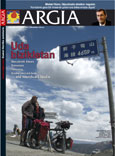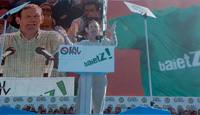Society
Environment
Politics
Economy
Culture
Basque language
Feminism
Education
International
Opinion
sunday 25 may 2025
Automatically translated from Basque, translation may contain errors. More information here. 
Imaz versus Ibarretxe, that's what the article sells
- The article by Josu Jon Imaz has confused the margins, in the political sphere of Basque society in general, but mainly in the trio that supports the Government and also in its party. It is not tender to understand why he has now launched these reflections, but the context is at least very significant. On the one hand, when ETA has put an end to the ceasefire and on the other hand, at the threshold of the management selection process at the internal level of the PNV. At a very important moment, the party seems like an attempt to mark a different policy.
Imaz’s opinion articles, on the other hand, have boasted of dust, but it cannot be said that its content has become completely new, since it has made repeated statements of a similar nature, both verbally and in writing, and in its party it is known that this discourse has supporters and opposites.
Taking the context of the end of the truce, the most surprising thing is how it reflects President Ibarretxe’s opposition to the referendum; or at least that is what is reflected in society. Now will come the nuances and explanations of Imaz and others of the party, but this will hardly cover that first impression, which is that one wants to take Ibarretxe closely.
As for President Ibarretxe, the basis of his last two legislatures is questioned by questioning the same consultation.Ibarretxe
and the Government’s Political Council made it clear last summer that if the ceasefire failed they had Plan B nearby and they did not fully clarify what it was, most of us saw in the axis of the possible initiative the Ibarretxe plan rejected by Madrid and the shadow of the consultation. In the face of the possible failure of the peace process, the President and the will of the triad to regain political initiative were clearly socialized.
Josu Jon Imaz also cites the argument to withdraw the political initiative from ETA, but in another direction, because ETA can support the possibility of consultation. It is an absolutely contradictory argument that, in order to prevent ETA from taking political initiative with its violence, the possible use that ETA can make determines the political axis of the Government in recent years. Sometimes, it seems that the armed organization is considered more as a grip and an argument than a real argument. It has been heard over and over again in the last six years that the nail of the matter is not ETA, but the right of decision of the citizens of the Basque Country. This article has turned that nail upside down, at least for now.
When the Basque Government, led by Ibarretxe, has expressed its intention to comply with its electoral mandate to consult, the EA and the United Left have strongly supported the intention. The address was a little quiet. Well, the answer has come. Even now, the two allied governments of the PNV have soon shown their disagreement with Imaz’s article. The Basque society is now awaiting the words of Ibarretxe.
Arre or so, the formation of the Government of Navarre no longer has a margin and this week we will finally know if the PSN takes NaBai and the United Left as allies in the new government, or if it leaves it in the hands of the UPN.
The alternative would be to govern the UPN in the minority, but the right-wing Navarrese will hardly accept this without agreeing on a minimum base of the PSN. It would be like entering a grotto full of holes without light, if you are not aware of whether you will jump to the hole in the first one or in the second or third one. And the UPN's are not that naive. The possibility of new elections would also be there, but they all reject it, not only would it seriously damage the image of politicians in general, but it would also damage the PSN in particular, because, being the key to governance, it would show that it has not had the capacity to form a new government.
There is more room in Álava, because next week the Plenary of the General Assembly will be held on the 26th. But a small margin, though. And it is impossible to guess the stick of command that the socialist Txarli Prieto will take over the jealous Eto Xabier Agirre. The PP has the key here, and what happens in Navarre seems to condition the Arabaco. There’s a lot at stake, in Alava as well as in the PNV.
Taking the context of the end of the truce, the most surprising thing is how it reflects President Ibarretxe’s opposition to the referendum; or at least that is what is reflected in society. Now will come the nuances and explanations of Imaz and others of the party, but this will hardly cover that first impression, which is that one wants to take Ibarretxe closely.
As for President Ibarretxe, the basis of his last two legislatures is questioned by questioning the same consultation.Ibarretxe
and the Government’s Political Council made it clear last summer that if the ceasefire failed they had Plan B nearby and they did not fully clarify what it was, most of us saw in the axis of the possible initiative the Ibarretxe plan rejected by Madrid and the shadow of the consultation. In the face of the possible failure of the peace process, the President and the will of the triad to regain political initiative were clearly socialized.
Josu Jon Imaz also cites the argument to withdraw the political initiative from ETA, but in another direction, because ETA can support the possibility of consultation. It is an absolutely contradictory argument that, in order to prevent ETA from taking political initiative with its violence, the possible use that ETA can make determines the political axis of the Government in recent years. Sometimes, it seems that the armed organization is considered more as a grip and an argument than a real argument. It has been heard over and over again in the last six years that the nail of the matter is not ETA, but the right of decision of the citizens of the Basque Country. This article has turned that nail upside down, at least for now.
When the Basque Government, led by Ibarretxe, has expressed its intention to comply with its electoral mandate to consult, the EA and the United Left have strongly supported the intention. The address was a little quiet. Well, the answer has come. Even now, the two allied governments of the PNV have soon shown their disagreement with Imaz’s article. The Basque society is now awaiting the words of Ibarretxe.
Arre or so, the formation of the Government of Navarre no longer has a margin and this week we will finally know if the PSN takes NaBai and the United Left as allies in the new government, or if it leaves it in the hands of the UPN.
The alternative would be to govern the UPN in the minority, but the right-wing Navarrese will hardly accept this without agreeing on a minimum base of the PSN. It would be like entering a grotto full of holes without light, if you are not aware of whether you will jump to the hole in the first one or in the second or third one. And the UPN's are not that naive. The possibility of new elections would also be there, but they all reject it, not only would it seriously damage the image of politicians in general, but it would also damage the PSN in particular, because, being the key to governance, it would show that it has not had the capacity to form a new government.
There is more room in Álava, because next week the Plenary of the General Assembly will be held on the 26th. But a small margin, though. And it is impossible to guess the stick of command that the socialist Txarli Prieto will take over the jealous Eto Xabier Agirre. The PP has the key here, and what happens in Navarre seems to condition the Arabaco. There’s a lot at stake, in Alava as well as in the PNV.
Most read
Using Matomo
#1
#2
#3
Xabier Letona Biteri
#4
Nagore Irazustabarrena Uranga
You are interested in the channel: Juan Jose Ibarretxe
2021-07-27
Mikel Asurmendi
Tomas Urzainki: «Ibarretxe Planak ez du gure nazio-genozidioa azaltzen»
Tomas Urzainkik demokrazia eta subiranotasun kontzeptuak batu ditu bere azken liburuan. Nafarroako Infanzones-en Konstituzioko «Pro libertate patria gens libera state» maxima izan du erreferenteetako bat. Hots, «Estatua libre izan dadin, jendarteak ere libre behar du»... [+]
2021-07-16
Ibarretxeren posizioaz hitz egin eta idazten da (Bero-beroan)
Urtea hasi eta genero biolentziaren danbatekoa gogorra izan da. Begoña Bohoyoren hilketak eta kasuaren inguruan izandako gorabeherek -epaileak lehen une batean erasotzailea libre utzi izana, erasotua hiru egunez bahitua izana...- erreakzio andana sortu dute, halako beste... [+]
2021-07-12
Xabier Letona Biteri
Patxi Zabaleta
«Ibarretxe planaren antzeko bat beharko genuke Nafarroan ere»
Foru Legebiltzarrerako Nafarroa Bai (NaBai) koalizioko zerrendaburua izango da ezker abertzaleko buruzagi historikoa. Nafarroako politikaren une garrantzitsuenak lehen lerrotik bizi izan ditu azken 30 urteetan. Une esanguratsuenetakoa protagonismotik bizi dezake bi hilabete... [+]
2021-06-01
Axier Lopez
The U.S. intelligence services. United States gave the Ertzaintza "anti-terrorist training" at the time of Ibarretxe
In 2004, the Ertzaintza received an "anti-terrorist training" from US officials, according to a document declassified by the U.S. Department of State. The Spanish State received several benefits in exchange for the unconditional protection granted by the government of José María... [+]
2017-02-23
Xabier Letona Biteri
Between Mas and Ibarretxe, Elorrieta was missing in Kursaal
Artur Mas and Juan Jose Ibarretxe. Two presidents, two routes, one dream: the right of peoples to decide. Mas explained how the Catalan is going, his key here is Ibarretxe. And yesterday's Kursaal lacked the spirit of Joxe Elorrieta.
2017-02-22
ARGIA
[LIVE] Conference between Ibarretxe and Mas
The Catalan process and the right to decide will be discussed this afternoon by the President of Catalonia, Juan José Ibarretxe, and the President of Catalonia, Artur Mas, at the Kursaal in San Sebastián. As the conference space is full, it will be possible to continue live in... [+]
2016-11-16
Iosu Alberdi Atxurra
Sara will unite the multiple victims within the framework of the days of peace and coexistence in Vitoria
Sara presented the conference “Human Rights, Solution, Peace”. Three roundtables will be held in Vitoria-Gasteiz from 28 to 30 November. “Coexistence, respect for the different, dialogue and sustained action are essential components for the activation of society,” they... [+]
2015-10-06
Xabier Letona Biteri
Ibarretxe and Mas
30 DECEMBER 2004, the Basque Parliament approved the Ibarretxe Plan with three essential votes – three to three sides – of Batasuna, although it showed clear opposition to it in the previous weeks and months. The surprise was of great magnitude in Basque society and also in... [+]
2014-04-30
ARGIA
Erabakitzeko eskubidea defendatu dute Ibarretxek, Zabaletak eta Aoizek
Juan Jose Ibarretxe EAEko lehendakari ohia, Gemma Zabaleta PSEko kide eta Gizarte Politiketarako sailburu ohia, eta Floren Aoiz Sorturen Iratzar Fundazioko zuzendaria bildu ditu Gure Esku Dago ekimenak Bilbon antolatutako mahai-inguruak. Erabakitzeko eskubidearen alde agertu... [+]
2013-05-06
Xabier Letona Biteri
For the cunning
Ibarretxe’s interrogation and the Loyola agreement
The Ibarretxe-zapatero meeting did not provide any additional extra information and performed its theoretical function, which was to exhaust one stage of the President's travel page. Much has been said about the staging and the special treatment offered by Zapatero to Ibarretxe... [+]
2013-05-02
Onintza Irureta Azkune
Ibarretxe in Spanish sustatu.com
Aitor is a user who brings up the topic of what people think of the use of informal or “popular” Basque by the President of the Basque Country. A lot of people thought about Adrian’s thinking. Aitor believes that the President conveys closeness and naturalness, but he also... [+]
2013-05-02
Xabier Letona Biteri
For the cunning
Ibarretxe-Lopez, the competition is already open
After knowing that Juan José Ibarretxe will be the candidate of the PNV for the fourth time, the characterization of this new session is what remains in the air now. It will be determined little by little, but it will always have to be adapted to the desires of the two main... [+]
2013-02-21
Patxi Zabaleta
Nafarroako Konbenioa eta EAEko Kontzertu Ekonomikoa batean negoziatu beharra
Hego Euskal Herriak denboran zehar eutsi duen eskumen historikorik funtsezkoenak zerga eskumenak eta ondoriozko ahalmen ekonomikoak dira.
Eguneraketa berriak daude
















